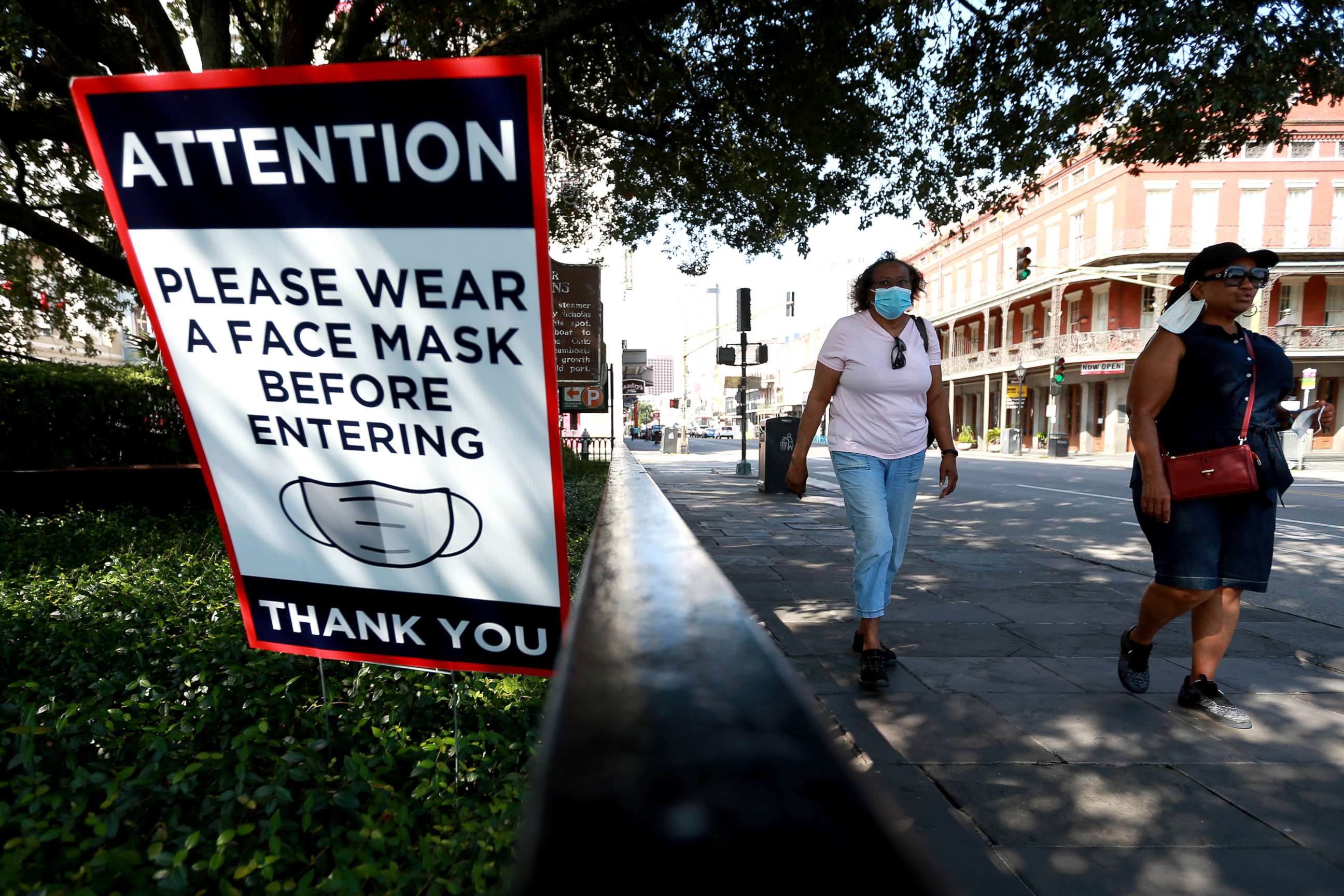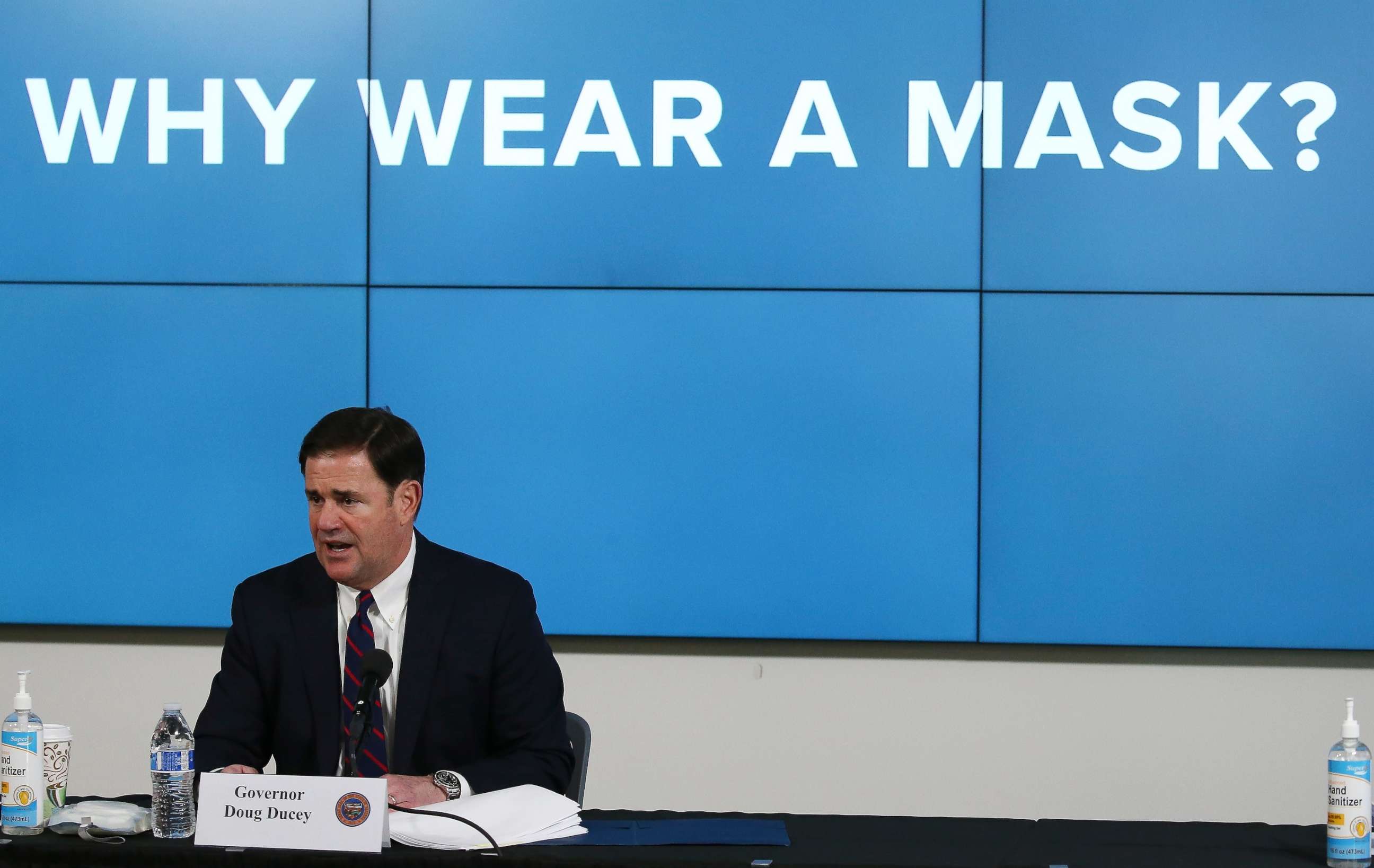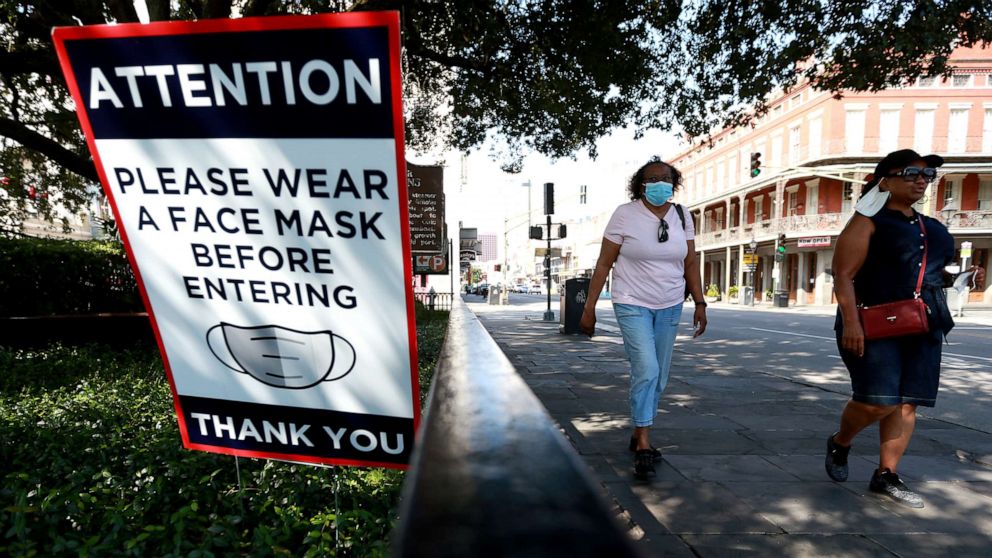Who is exempt from wearing a face mask during the COVID-19 pandemic?
Talk of face mask exemption during the COVID-19 pandemic has been circulating the internet in recent weeks, but experts say very few people qualify, and the decision is up to each person's doctor.
"People with underlying chronic lung disease, such as COPD or asthma, should be able to wear a non-N95 facial covering without it affecting their oxygen or carbon dioxide levels," Dr. Albert Rizzo, chief medical officer for the American Lung Association, told ABC News, adding that "masks have no detrimental effects, even in patients with chronic lung disease."
When asked if people who have difficulty breathing with a face mask on should be exempt, he stated: "There are many different facial covers or even shields that could be worn instead, if one cannot tolerate the conventional face mask."
Rizzo said "cases of exemption are very few and far between," and "people with supplemental oxygen or compromised respiratory status which become short of breath even when walking might meet criteria, which in that case, going out in public is a health risk to the person."
The Centers for Disease Control and Prevention (CDC) explains that in some situations -- such as people with intellectual and developmental disabilities, mental health conditions or other sensory sensitivities such as autism spectrum disorder -- wearing a mask could create distress.
"I could fathom rare cases of PTSD where past trauma involved a face covering; in such cases, wearing a mask may trigger potential flashbacks, but this is more an exception," Dr. Divya Jose, a psychiatrist in New York City told ABC News.
"I see lots of patients with mental health conditions including anxiety, psychotic and mood disorders, and I am yet to see one come in without a mask," she added. "None of my patients have felt that wearing a mask triggers any of their symptoms."

As parts of the United States battle a surge in coronavirus cases, misleading posts and videos have been spreading on social media which show people claiming to be medically exempt from wearing a mask during the pandemic.
Certain "Face Mask Exemption Cards" are also circulating, claiming to exempt the person in possession of the card from wearing a mask due to underlying health conditions.
A common mask exemption card -- which has proven to be fake -- reads: "Wearing a face mask poses a mental and/or physical risk to me. Under the Americans with Disability Act (ADA), I am not required to disclose my condition to you."
The Freedom to Breathe Agency (FTBA), the group selling the cards online, is not a government organization, federal officials said, and these cards do not carry the force of law.
With multiple countries requiring masks to be worn in public, it is important to address the question: Do medical exemptions for face coverings really exist?
The World Health Organization (WHO) and CDC have both issued statements advising people to wear face coverings in public in order to decrease the spread of COVID-19. The WHO states that face masks of breathable material, worn properly, will not lead to health problems.
The WHO also acknowledges that wearing a face covering is not convenient and has some disadvantages. They list these disadvantages as self-contamination from touching the mask and then the eyes, contamination if the mask gets wet and skin irritation or worsening acne when the mask is used for long hours. None of the disadvantages, however, are reasons for exemption.
They say that masks may be difficult to wear for children, people with developmental challenges, mental illness, elderly persons with cognitive impairment, chronic respiratory problems and facial trauma or recent surgery. Still, none of the conditions are listed as reasons for exemption.
Each country has implemented its own rules regarding masks. In the U.S., the CDC advised everyone over the age of 2 to wear a mask in public unless they have trouble breathing or are unconscious, incapacitated or otherwise unable to remove the cloth face covering without assistance.
Dr. Mona Degan, a primary care physician in Los Angeles who works with patients with asthma, told ABC News: "I do not see asthma as an impending factor, unless the person is in active acute respiratory distress -- in which case going out in public is not advised."

Dr. Catherine Lord, a psychologist at the University of California, Los Angeles, told ABC News that for children with neurodevelopmental disorders, such as autism spectrum disorder, wearing a mask "could be really difficult, as they often have strong reactions to different sensations."
"Kids with autism could potentially be gradually eased to the idea of wearing a mask," said Jose.
"Wearing a mask 5-10 minutes inside the home can help desensitize the person and relieve any anxiety the patient might have," Rizzo added. It is also recommended by CDC that all children over the age of 2 wear a face covering when leaving the home.
Dr. Christine Thang, a pediatrician at Mattel Children's Hospital at University of California, Los Angeles, told ABC news: "Children with autism may have difficulty understanding why they need to wear a mask and may not like the texture of it against their face. For children who may have difficulty understanding or tolerating their masks, I would encourage families to consult their pediatrician for support."
"To protect everyone from COVID-19, children should wear their face coverings when outside the home," she added.
Modifications to the traditional face covering can also be a possible solution. "Masks come in different materials, fittings and sizes which can be made more comfortable to wear," said Dr. Roy Berenholtz, an anesthesiologist who has been in the front lines of the pandemic. "There is absolutely no reason why anyone should not wear a mask," he added.
The American Lung Association stated that the decision to give mask exemption to a person should be up to that person's physician. The person's concerns should be weighed against societal needs to mitigate the spread of the virus. In some instances, physician reassurance regarding the safety of the face coverings may be all that is needed.
At this time, professionals have not provided clear guidelines to determine exemption. It's up to the clinicians to balance public health interest and individual disability modifications when granting exemptions regarding masks.
The American Lung Association states that the role of the face coverings is, along with social distancing, a public health priority necessary to decrease the spread of COVID-19.
Yalda Safai, M.D., M.P.H., is a psychiatry resident in New York City and a contributor to the ABC News Medical Unit.
This report was featured in the Tuesday, July 21, 2020, episode of “Start Here,” ABC News’ daily news podcast.
"Start Here" offers a straightforward look at the day's top stories in 20 minutes. Listen for free every weekday on Apple Podcasts, Google Podcasts, Spotify, the ABC News app or wherever you get your podcasts.




